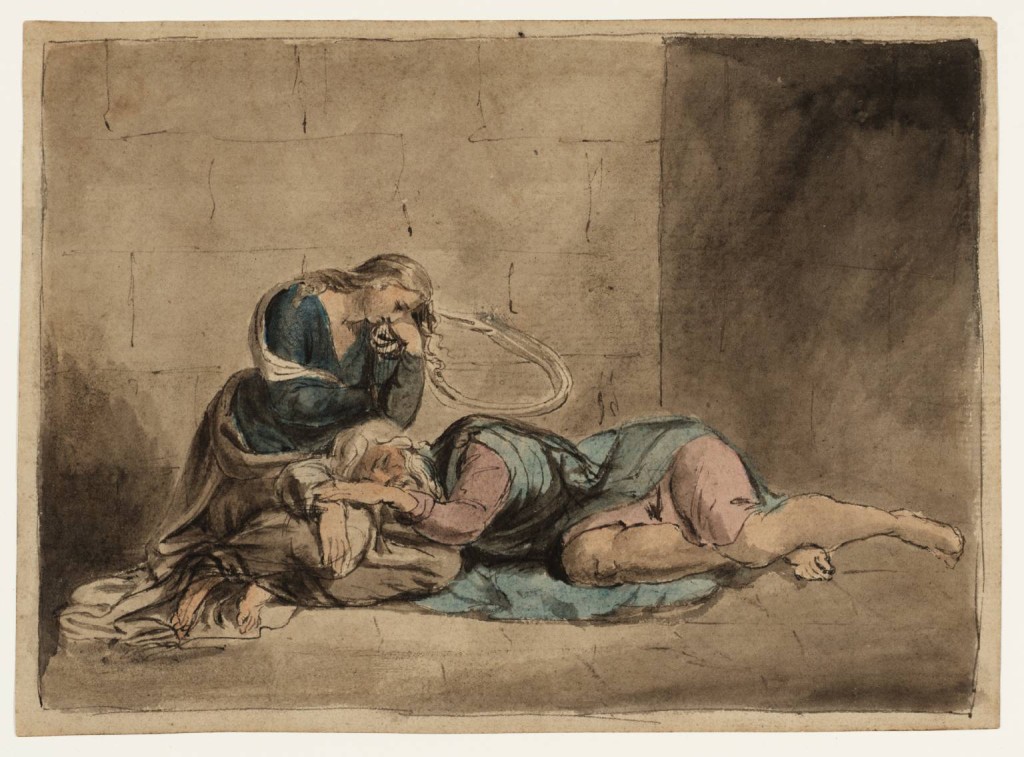Students are continually opening my eyes to new things in the literature I teach. Lisa Fetter, for instance, has made me realize that contrasting Doctor Faustus with King Lear can work as a powerful meditation on the positive role of adversity in our lives.
Noting that both Faustus and Lear are men at the top of their professions, Lisa asks why one dies in peace while the other dies in hellish torment. The difference lies in what happens on the way to death and how they respond.
Both are egotists. Lear, accustomed to getting whatever he wants as king, imperiously demands love from his family. Instead he receives dissembling from the two daughters who hate him and silence from the one who loves him. After ceding his kingdom to Goneril and Regan, he thinks for a while that he still has the powers of a king and is driven mad by his inability to acknowledge and accept that he has lost them. Only when he is at his lowest point does he jettison his pride and open himself to the love of Cordelia.
The change is dramatic. He assures her in prison that he has never been happier:
Cordelia: We are not the first
Who with best meaning have incurred the worst.
For thee, oppressèd King, I am cast down.
Myself could else outfrown false fortune’s frown…
Lear: No, no, no, no! Come, let’s away to prison.
We two alone will sing like birds i’ th’ cage.
When thou dost ask me blessing, I’ll kneel down
And ask of thee forgiveness. So we’ll live,
And pray, and sing, and tell old tales, and laugh
At gilded butterflies, and hear poor rogues
Talk of court news, and we’ll talk with them too—
Who loses and who wins, who’s in, who’s out—
And take upon ’s the mystery of things
As if we were God’s spies. And we’ll wear out
In a walled prison packs and sects of great ones
That ebb and flow by the moon.
When Lear dies of a broken heart over Cordelia’s death, it is at least a heart that is full of love. In that way he is like Gloucester, who also dies with a full heart upon his reencounter with Edgar.
Faustus, by contrast, is never brought low. At the end of his life he is being feted by royalty and he retains the respect of his university colleagues. Perhaps it is because external circumstances have not humbled him that he doesn’t open his heart to God’s love. His despair–he is contemplating suicide when he encounters the Old Man—is not enough to turn him from his Satanic pride. Note how the love described by the Old Man is similar to what Lear gets from Cordelia:
Old Man: Ah, stay, good Faustus, stay thy desperate steps!
I see an angel hovers o’er thy head,
And, with a vial full of precious grace,
Offers to pour the same into thy soul:
Then call for mercy, and avoid despair.
Faustus here is butting up against the reality of his impending death. Whereas Lear accepts the offer of the vial, however, Faustus finds the vision too painful and calls upon devils to torture the man. He cannot let go of his prideful self-sufficiency and instead demands love on his own terms. This proves as fake as the love initially demanded by Lear:
One thing, good servant, let me crave of thee,
To glut the longing of my heart’s desire,—
That I might have unto my paramour
That heavenly Helen which I saw of late,
Whose sweet embracings may extinguish clean
Those thoughts that do dissuade me from my vow,
And keep mine oath I made to Lucifer.
Earlier in the play Faustus asks for a wife but can only get a “hot whore.” You have to give of yourself to have a soulful relationship–this is what Lear does to find his love for Cordelia–and Faustus will not take that step. His relationships therefore are condemned to be fleeting:
Her lips suck forth my soul: see, where it flies!—
Come, Helen, come, give me my soul again.
Here will I dwell, for heaven is in these lips,
And all is dross that is not Helena.
Lear may die sad but, as I said, he dies with a full heart. Faustus, by contrast, dies in agony as he tries to hold on to the material world:
No, Faustus, curse thyself, curse Lucifer
That hath depriv’d thee of the joys of heaven.
[The clock strikes twelve.]
O, it strikes, it strikes! Now, body, turn to air,
Or Lucifer will bear thee quick to hell!
[Thunder and lightning.]
O soul, be chang’d into little water-drops,
And fall into the ocean, ne’er be found!
Enter DEVILS.
My God, my god, look not so fierce on me!
Adders and serpents, let me breathe a while!
Ugly hell, gape not! come not, Lucifer!
I’ll burn my books!—Ah, Mephistophilis!
[Exeunt DEVILS with FAUSTUS.]
As Lisa and I discussed what differentiates Lear and Faustus, we wondered whether the latter’s intellect gets in his way. Lear is a creature of emotions whereas Faustus lives in his head. It is the intellectual who can’t, in the end, surrender to love.
Lisa asked me whether I could imagine a drama where an intellectual, by being humiliated and brought low like Lear, finds a path to salvation. I was stumped and could only think of the opposite, figures like Dorian Gray whose hard hearts create everlasting hells for themselves.
Better a hot king than a cold intellectual, I guess.


